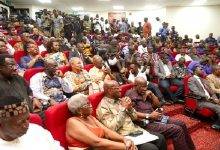FELIX Amakye, a lecturer at the Institute of Local Government Studies (ILGS), has urged community leaders to arm them-
selves with good leadership skills to get their messages accepted for effective and efficient implementation of projects.
He defined leadership as “trait and the ability to exert influence and have others accept their influence to produce change or performance” and also a “process whereby an individual or a small group influences others to achieve com- mon goal”.
Mr Amakye made the call when he addressed members of the District Sanitation and Hygiene Advocacy Teams (DSHAT) at a meeting at Awutu Beraku in the Central Region.
Leadership, he explained, was not a position, but leaders could emerge at any level of an organisation, irrespective of whether they were shy, extrovert, educated or not, organised or disorganised, charismatic or dull, and the art was something that could be learned.
Mr Amakye explained that “possessing cre- ativity in action, vision with courage, fortitude to put vision into reality, flexibility, commitment to change things for better, and with ability to back off when someone else is a better leader,” were good leadership qualities.
He also said that “a good leader must be able to delegate, have integrity, make things happen, must stand up for communities and also be ac- countable. In leading people, a good leader must show respect to communities, and understand their cultural norms”.
Mr Amakye spoke of what constituted good leadership styles such as directing, coaching, supporting and delegating, adding that it is about leading people, commanding people and guiding them.
Constituency building, he said, “called for increased ownership, support, responsibility, cost-effective programming, better response to community needs and concerns.
“It also includes culturally appropriate strate- gies, messages, increased coverage for informa- tion, services, increased advocacy for service, policy change, among others.”
Mr Amakye touched on community action planning, defining it as “a process which guides the focusing of ideas and decides the neces- sary steps towards the attainment of particular goals”.
Nora Ollennu, Chief Executive Officer for Intervention Forum, observed that her organisa- tion, together with stakeholders, were climbing the advocacy ladder, hence the need for for- mation and training of locally-based structures such as citizenry groups or advocacy teams to be the voice for the voiceless at local level.
“To do this, they will need the requisite knowledge and skill base as to how to plan, inform, consult and engage their constituency. When people are involved in the decision-mak- ing process and well informed, it would help promote transparency, accountability, probity, rule of law, inclusiveness, active participation and ownership,” she noted. –gna.org






